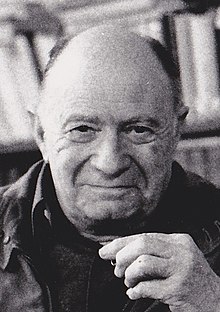
Back Jacques Ellul Afrikaans جاك إلول Arabic چاكويس الول ARZ Jacques Ellul Catalan Jacques Ellul Czech Jacques Ellul German Jacques Ellul Esperanto Jacques Ellul Spanish ژاک یول Persian Jacques Ellul Finnish
Jacques Ellul | |
|---|---|
 Ellul in 1990 | |
| Born | January 6, 1912 Bordeaux, France |
| Died | May 19, 1994 (aged 82) Pessac, France |
| Education | University of Bordeaux University of Paris |
| Era | 20th-century philosophy |
| Region | Western philosophy |
| School | Christian anarchism Continental philosophy Non-conformists of the 1930s |
Notable ideas | Technological society |
| Righteous Among the Nations |
|---|
 |
| By country |
Jacques Ellul (/ɛˈluːl/; French: [ɛlyl]; January 6, 1912 – May 19, 1994) was a French philosopher, sociologist, lay theologian, and professor. Noted as a Christian anarchist, Ellul was a longtime professor of History and the Sociology of Institutions on the Faculty of Law and Economic Sciences at the University of Bordeaux. A prolific writer, he authored more than 60 books and more than 600 articles over his lifetime,[1] many of which discussed propaganda, the impact of technology on society, and the interaction between religion and politics.
The dominant theme of Ellul's work proved to be the threat to human freedom and religion created by modern technology. He did not seek to eliminate modern technology or technique but sought to change our perception of modern technology and technique to that of a tool rather than regulator of the status quo.[2] Among his most influential books are The Technological Society and Propaganda: The Formation of Men's Attitudes.
Considered by many a philosopher, Ellul was trained as a sociologist, and approached the question of technology and human action from a dialectical viewpoint. His writings are frequently concerned with the emergence of a technological tyranny over humanity. As a philosopher and theologian, he further explored the religiosity of the technological society. In 2000, the International Jacques Ellul Society was founded by a group of former Ellul students. The society, which includes scholars from a variety of disciplines, is devoted to continuing Ellul's legacy and discussing the contemporary relevance and implications of his work.[3]
- ^ Marva Dawn, Eugene Peterson, The Unnecessary Pastor: Rediscovering the Call, Wm. B. Eerdmans Publishing, 2000, p. 103
- ^ Ellul, Jacques. Perspectives On Our Age: Jacques Ellul Speaks On His Life And Work. House of Anansi Press Inc., Toronto, ON. 2004. pp 89.
- ^ "About". International Jacques Ellul Society. Archived from the original on December 3, 2013. Retrieved November 30, 2013.